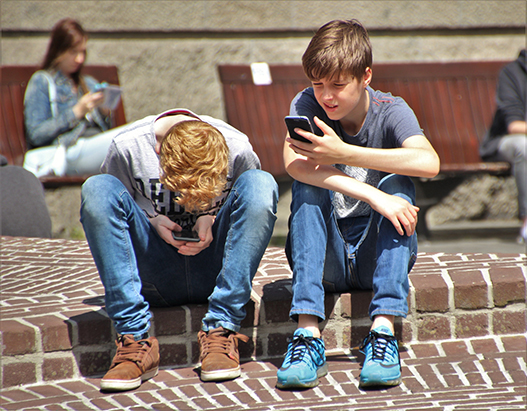COVID-19 Impact on Rise in Social Media Usage
Following the COVID-19 pandemic, social media usage has increased at an ultimate high for pre-teens and adolescents. Caregivers are not alone in expressing concerns about their school-aged children’s social media use. It is on the top of the list for children’s and youth’s health. A second worry that stems from social media usage is adolescent’s mental health.
Caregivers must follow a checklist when looking for possible signs of social media overload:
- Do I have a social media use family agreement in place?
- How long is my child on social media? Can my child stop using social media when asked?
- Is my child using social media safely? Do I have their account passwords? Are parent controls set?
- Does my child look like they are enjoying being on social media? Have I checked in with my child to see how they are using and feeling about social media?
- Has my child been irritable or upset in the last few months?
- Has my child said any negative self-talk comments about themselves in the way they look or overall self-esteem?
- Does my child constantly tell me about the new social media fads and what items they need to feel accepted by their peers?
- Am I being a positive role model with my social media usage?
Statistics for Social Media Usage Can Affect Social-Emotional Development in Pre-teens and Adolescents:
- 95% of children 13 to 17 years old use social media apps.
- Teens who spend more than three hours a day on social media can double their risk for depression and anxiety symptoms.
- A national survey found that 33% of girls 11 to 15 years old feel addicted to social media and more than half of teens say they cannot give up social media.
- Teenagers are addicted to FOMO (Fear of missing out).
Effects of social media usage and peer culture:
According to Laser-Maira & Nicotera (2023) “Within the context of media influence, it is postulated that features of mass media entertainment (e.g., language, clothing, and cultural settings) take on a primary role in the transmission of implicit social knowledge with the adolescent peer culture” (Laser-Maira & Nicotera, 2021, p. 150). Meaning, that social media creates the culture of what is “socially” acceptable clothing to their peers.
Teens are subject to forming parasocial relationships, which is one with celebrities via social media. This can influence an adolescent’s choice of how they act, think, and feel. Teens must talk about these parasocial relationships with trusted adults so that media can be used positively.

Benefits of social media use:
Identity and Media: The internet provides a world for self-expression and identity. This can be a world where they are making connections with online friends and similar interests. Cyberspace can be a platform where youth are accepted and able to explore their identity. For instance, “youth who identify as a minority, due to ethnicity, race, gender identity, or sexual orientation, online experiences may carry greater weight, as a venue to explore their identity with a mainstream culture” (Laser-Maira & Nicotera, 2021, p. 152).
Negatives of social media use for pre-teens and adolescents:
Body image: Media can play a powerful part in how girls and women view their bodies and view the standards of beauty that are at risk for negative body image and eating disorders. It is found that “46% of teens 13 to 17 said social media made them feel worse about their bodies”. This can lead to teens having low self-esteem and negative thoughts about the way they look.
Sleep patterns: Teens are using social media for longer periods so they may not be sleeping. For instance, “research demonstrates that media consumption disrupts youth’s sleep patterns: by the amount of time spent texting during the day, engaging in media use after moving toward sleep, and being awakened in the night by mobile phone alerts. Mobile phone use after 9:00 pm was related to diminished quality of sleep” (Laser-Maira & Nicotera, 2021, p.158). Caregivers must notice if their child is on social media instead of sleeping or if screens are collected at bedtime.
Cyberbullying:
Cyberbullying is any bullying that takes place behind a screen. 64% of teens reported they often are exposed to hate-based content. Cyberbullying is the most common online risk for teens and is linked to developing symptoms of depression. Make sure to check in with your child about how they feel about their friends and how they feel about social media.
When to Seek Out Help:
If you notice that your child is using social media for a long period and have concerns about their emotional development, social workers can help talk to your child. If your child’s emotional development is of concern due to social media, social workers can help work with your child to uncover what they have experienced and how to help them. Common changes in behavior due to social media use would be an increase in anxiety, depression, sleep issues, lack of self-esteem, etc. Social workers can use Cognitive Behavioral Therapy and Dialectical Behavioral Therapy to help your child understand negative thoughts and what is in and out of their control. Your child can learn strategies when experiencing intense emotions and how to use those skills to help reframe positive thinking.
It’s OK to Ask for Help:
As a caregiver, it can be hard to help navigate social media and keep your kids safe. You are not alone in this; let’s work together to help create a healthy social media plan with your child. This information is not meant to overwhelm you or cause stress.
Resources:
Negative Effects of Social Media (clevelandclinic.org)
Laser-Maira, J. A., & Nicotera, N. (2021). Working with adolescents: A guide for practitioners. The Guilford Press.
Teaching Kids to Be Smart About Social Media (for Parents) – Nemours KidsHealth
Social Media & Your Child’s Mental Health: What the Research Says – HealthyChildren.org

Eyas Landing is a therapy clinic with a mission to provide evidence-based and family-centered therapy services for children, adolescents, and their families. The primary goal is to deliver relationship-based interventions within the most natural environments and to empower families to reach their full potential. To achieve this goal, our highly educated, compassionate staff dedicates time and expertise to create experiences that maximize therapeutic outcomes. The strength, determination, and perseverance of our clients are evident as they succeed in therapy, and ultimately in their daily lives.
Eyas Landing offers a wide range of comprehensive services including Speech Therapy, Occupational Therapy, Physical Therapy, ABA Therapy, Social Work, Family Therapy, and Neuropsych testing. Services are provided throughout the Chicagoland area via Telehealth, In-Home, and in our state of the art clinic.
Want to learn more or you have a specific question? Feel free to connect with us here!



